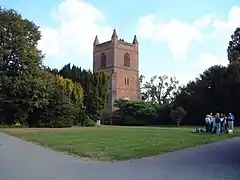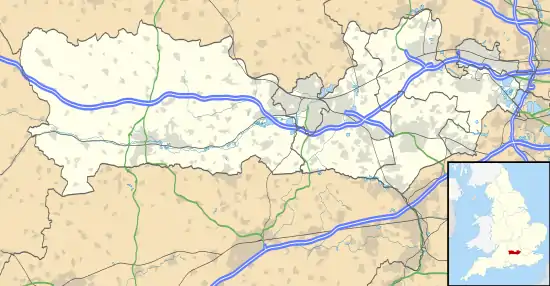Finchampstead
Finchampstead is a village and civil parish in the Wokingham Borough in the shire of Royal Berkshire, England. Its northern extremity is 2 miles (3 km) south of Wokingham, 5 miles (8 km) west of Bracknell, 8 miles (13 km) south-east of Reading, and 34 miles (55 km) west of Central London. It is an affluent area, with the village ranking as Britain's 31st wealthiest.[1] It has a high standard of living and is rated as one of the most desirable places to live in the UK.[2][3]
| Finchampstead | |
|---|---|
 Tower of St James' parish church | |
 Finchampstead Location within Berkshire | |
| Population | 668 (2011 Census ) |
| OS grid reference | SU7964 |
| Civil parish |
|
| Unitary authority | |
| Ceremonial county | |
| Region | |
| Country | England |
| Sovereign state | United Kingdom |
| Post town | WOKINGHAM |
| Postcode district | RG40 |
| Dialling code | 0118 |
| Police | Thames Valley |
| Fire | Royal Berkshire |
| Ambulance | South Central |
| UK Parliament | |
| Website | Finchampstead Parish Council |
Topography
Finchampstead parish extends from The Throat on the southern edge of Wokingham, just past the Inchcape Garage, down to the Tally Ho pub on the River Blackwater which forms the southern border with Eversley and its county Hampshire, over Eversley Bridge. Finchampstead Bridge is further east, just above Eversley Cross. To the east of the parish is Sandhurst and to the west are Swallowfield, Arborfield and Barkham.
The Roman road from London to Silchester traverses the parish from West Court through to Roman Ride off the A321. It is known as the Devil's Highway (Roman Britain) and is well preserved as a footpath and byway over much of its length through Windsor Forest. It is used as a road at West Court, and from Armholes past Heath Pool and along Roman Ride.
The Nine Mile Ride (the B3430 road) runs the breadth of Finchampstead, through California and then on, between King's Mere and Queen's Mere, to the boundary with Crowthorne, and thence to Pinewood and finally Bracknell. The area between is California and Crowthorne is sometimes known 'The Rides' due to several straight roads cut through this part of Windsor Forest by George III. Others included Barkham Ride, Heath Ride and Gorse Ride. California is the name of this northern part of the parish. It is a large residential village with its own country park around Longmoor Lake, on the edge of Barkham Common.
The southern part of the parish includes the parish church; Finchampstead village itself, at the top of Fleet Hill on the B3348 road; Finchampstead Lea, to the west along the A327 road; and the woodlands of the Ridges, spreading north to the Nine Mile Ride. This is a dense, mostly pine tree, wood much of which, including Simon's Wood, is owned by the National Trust. Its hills give panoramic views of the surrounding area.
St. James' Church
The Church of England parish church of St James is on top of a prominent hill and has an old Roman earthwork around it. It was probably the site of a pagan temple.[4] The Roman road between London and Silchester, called the "Devil's Highway", ran through the middle of the parish. A Roman milestone survives at Banisters.[4]
Local government
Finchampstead has a parish council with a total of 17 councillors elected by the North & South wards. The parish is in Wokingham Borough unitary authority.
Transport
Reading Buses service No 3 or "The Leopard Bus," links northern Finchampstead with Wokingham.
History
Warren Wood is a secondary woodland of birch, oak and pine with a large meadow, between Nine Mile Ride and Warren Lane. It includes a scheduled monument, a round burial mound, which is the largest example of a bell barrow in Berkshire and dates from between 2000 and 1300 BC. Trees have been removed from the mound in recent years as their roots can damage archaeological remains and paths have been re-routed around the mound.
Finchampstead's Old English toponym is said to have derived from the large variety of finches that still populate the area. It is referred to by the younger generation as 'Finch'. St. Oswald apparently visited the village in the 7th century and named the local holy well, which is recorded in the Anglo-Saxon Chronicle to have flowed with blood in times of National crisis.[4]
Finchampstead is a richly wooded area on the western edge of old Windsor Forest and once the centre of one of its divisional "walkes" and bailiwicks. It was the hunting place of Royalty and an old tale tells how King Henry VII brought his son, Prince Arthur, out onto the Ridges to see his bride, Catherine of Aragon, for the first time.[4] His other son, Henry VIII, is said to have wooed two sisters at East Court Manor until one committed suicide in a fit of jealousy.[4]
Finchampstead's Wellingtonia Avenue was planted with one hundred giant sequoia trees, as a monument to the 1st Duke of Wellington in the 1860s.[4] He built the Wellington College school nearby.
The northern part of the parish lies on London clay, which has given rise to small scale brick works. The site of California in England was originally excavated by John Walter for the building of Bearwood House. To the west there was an extensive works around Kiln Ride, with a light railway connecting it to the railway between Wokingham and Crowthorne.
Notable people
- Commissioner Catherine Bramwell-Booth CBE OF, (Granddaughter of the Salvation Army Founders William and Catherine Booth 'Mother of the Salvation Army'), lived in Finchampstead with two of her sisters Lieut. Col. Olive Booth and Major Dora (Dorothy) Booth. The three are buried with their sister Colonel Mary Bramwell Booth CBE and alongside their brother Bramwell Bernard Booth and his wife Jane in the churchyard of St James'. Catherine died aged 104, Olive 98 and Dora 95.
- Lieutenant Colonel Alfred Stowell Jones, recipient of the Victoria Cross for actions at Delhi during the Indian Mutiny, is buried in the churchyard of St James'.
- Christine Keeler lived on the Nine Mile Ride.
- Lady Liddel, MBE, lived at East Court. On her death she gave it to the parish as the St James's Church Centre.
- Brigadier General Ernest Macnaghten, former chairman of the Shanghai Municipal Council retired to Haygates in Finchampstead. He died there in 1948.[5]
- General Sir John Watson, recipient of the Victoria Cross for actions at Lucknow during the Indian Mutiny, is buried in the churchyard of St James'.
- Singer-songwriter, Laura Marling, grew up and attended primary school in Finchampstead.
Manors
There are three manor houses. East Court was next to the church, but has been replaced by a Victorian building and the name has been transferred to another house in the village. West Court is a 17th and 19th century house at Finchampstead Lea.[6] Banisters, on the lower slopes of Fleet Hill, is a brick Restoration house of 1683.[7]
Churches
The present St. James' parish church[8] is almost entirely Norman with a few alterations dating from the late 16th century. It has a Norman eastern apse and a brick tower built in 1720. The baptismal font in the church is late Saxon.[4]
The Baptist chapel was built in 1840. In recent years its congregation has outgrown the capacity of the chapel, so it has worshipped at Waverley School instead. In April 2010 the new Finchampstead Baptist Church Centre was opened in California.
St Mary and St John California is a new church that replaces the old Church Army church on the Nine Mile Ride. It is a shared ministry with St James.
Housing
The village has a number of old cottages. However, most of the parish's housing is at California, most notably the Fernlea Estate, built on private farmland, and the Gorse Ride estate, built on the site of a watercress farm and gorse woodland. Gorse Ride South estate was built as a temporary measure for only 10 years. The properties consist of terraced houses and terraced bungalows. All were designed by the Ministry of Housing, from Swedish timber, with textured plywood outer wall panels and solid concrete foundations. Although only designed for a lifespan of 10 years, all the dwellings are permanent properties, after being refurbished in 1974 with Swedish timber cladding on the external plywood walls, and tiled roofs over the previous felt roofs. By the 2010s, some of the council housing on the Gorse Ride South estate had fallen into disrepair. The houses have structural problems and poor drainage, and the bungalows have insulation and subsidence issues. In an effort to improve the estate, the large FBC community centre opened in 2010. As of 2018, Wokingham Borough Council has secured funding to redevelop the entire estate, starting 2018.
Amenities
The parish has three public houses: The Greyhound,[9] the Queen's Oak[10] and the Tally Ho.[11] The Tally Ho incorrectly describes itself as being in Eversley.[11] The Queen's Oak is the only pub of that name in England. The absence of public houses in the California area is due to a restrictive covenant imposed by John Walter when he sold the land in this area.
Finchampstead Church of England Primary School in the village is opposite the park and is popular for children from reception (age 5) to year 6 (age 11). A pre-school is run daily during term time in the Memorial Hall. Nine Mile Ride Primary school serves the California end of the parish. It has approximately 350 children.
There is a combined shop and filling station in the village, and a group of shops and a garage around the Nine Mile Ride crossroads.
The village hall is Finchampstead Memorial Hall, which was built in 1960. The parish has a scout group.[12] There is a children's playground area in the park. In California there is the Ratepayers Hall on the B3016 near the Nine Mile Ride crossroads.
The village has a nature reserve on its edge called Shepperlands Farm Nature Reserve.[13] The village also has a Site of Special Scientific Interest (SSSI) and Local Nature Reserve called Longmoor Bog, which is part of California Country Park.[14]
Sport and Leisure
Finchampstead has clubs for cricket,[15] football,[16] netball[17] and running.[18] The village also has some tennis courts. Finchampstead Football Club plays in the Hellenic Football League, and the Memorial Ground is the home ground of both the football and cricket clubs.
References
- "Britain's richest villages". Telegraph.co.uk. Retrieved 20 February 2017.
- . Wokingham Paper https://www.wokinghampaper.com/sunday-times-finchampstead/. Missing or empty
|title=(help) - "Sunday Times: Best Places To Live (UK)". Sunday Times.
- Ford, David Nash (2003). "History of Finchampstead, Berkshire". Royal Berkshire History. Nash Ford Publishing. Retrieved 28 December 2010.
- Armorial families : a directory of gentlemen of coat-armour (Volume 2), p270
- Ford, David Nash (2010). "History of West Court, Finchampstead, Berkshire". Royal Berkshire History. Nash Ford Publishing. Retrieved 28 December 2010.
- Ford, David Nash (2002). "History of Banisters, Finchampstead, Berkshire". Royal Berkshire History. Nash Ford Publishing. Retrieved 28 December 2010.
- Parish of Finchampstead and California
- The Greyhound
- The Queen's Oak Archived 23 July 2013 at the Wayback Machine
- Tally Ho
- 1st Finchampstead Scout Group
- Opening Times. "Shepperlands Farm | Berks, Bucks & Oxon Wildlife Trust". Bbowt.org.uk. Retrieved 12 April 2017.
- "Magic Map Application". Magic.defra.gov.uk. Retrieved 12 April 2017.
- Finchampstead Cricket Club
- Finchampstead FC
- Finch Netball Club
- Finch Coasters Running Club
Further reading
- Ditchfield, P.H.; Page, W.H., eds. (1923). A History of the County of Berkshire, Volume 3. Victoria County History. pp. 241–247.
- Pevsner, Nikolaus (1966). Berkshire. The Buildings of England. Harmondsworth: Penguin Books. pp. 143–144.
External links
| Wikimedia Commons has media related to Finchampstead. |